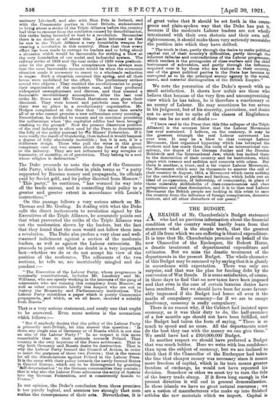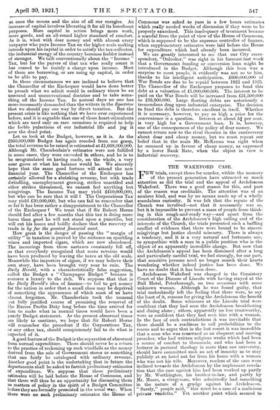THE BUDGET.
AREADER of Mr. Chamberlain's Budget statement who had no previous information about the financial condition of the country would hardly learn from that statement what is the simple truth, that the greatest of all ills from which we are suffering is bloated expenditure. It is true that Mr. Chamberlain promised on behalf of the new Chancellor of the Exchequer, Sir Robert Home, a drastic treatment of departmental expenditure and estimates. But we miss the drastic treatment of the departments in the present Budget. The whole character of this Budget may be summed up by saying that it is glumly in •accordance with expectation. There was only one surprise, and that was the plan for funding debt by the conversion of War Bonds. It is some satisfaction, of course, in these days to find that no new taxes have been imposed and that even in the case of certain luxuries duties have been remitted. But we should have been far more favour- ably impressed if the Budget had borne all over it the marks of compulsory economy—for if we are to escape insolvency, economy is really compulsory. There is no reason why, if the Cabinet had insisted upon economy, as it was their duty to do, the half-promises of a few months ago should not have been fulfilled, and the Budget had taken the form of saying, " There is so much to spend and no more. All the departments must do the best they can with the money we can give them." We could have had a £950,000,000 Budget. In another respect we should have preferred a Budget that was much bolder. Here we write with less confidence than upon the subject of economy, but we are inclined to think that if the Chancellor of the Exchequer had taken the line that cheaper money was necessary since it means more freedom of capital, which in its turn means greater freedom of exchange, he would not have repented his decision. Somehow or other we must try to turn the tide of the heavy trade slump. If it flows long enough in the present direction it will end in general demoralization. In these islands we have no great natural resources ; we are a nation of manufacturers who make up into finished articles the raw materials which we import. Capital is at once the means and the aim of all our energies. An increase of capital involves liberating it for all its beneficent purposes. More capital in action brings more work, more goods, and an all-round higher standard of comfort. As it is, what with dear money and with almost every taxpayer who pays Income Tax on the higher scale making inroads upon his capital in order to satisfy the tax-collector, the industrial energy of the country becomes feebler instead of stronger. We talk conventionally about the "Income " Tax, but for the payers of that tax who really count it has ceased to be mainly a charge upon income. Most of them are borrowing, or are using up capital, in order to be able to pay. In these circumstances we are inclined to believe that the Chancellor of the Exchequer would have done better to preach what we admit would in ordinary times be an unsound and unconventional doctrine and to take some- thing off the Income Tax. In normal days no one has more incessantly demanded than the writers in the Spectator that we should pay our way by direct taxation. But the present crisis is like nothing that We have ever experienced before, and it is arguable that one of those heart-stimulants which are used only on rare occasions is required to help the feeble pulsations of. our industrial life and jog it over the dead point.
Let us look at the Budget, however, as it is. As the £950,000,000 Budget has again receded from our grasp, the total revenue to be raised is estimated at £1,058,000,000. Although Mr. Chamberlain's estimates were not fulfilled in some cases, they were exceeded in others, and he is to be congratulated on having made, on the whole, a very near guess at what his balance would be. We sincerely hope that the same good fortune will attend the new financial year. The Chancellor of the Exchequer has certainly allowed for a shrinking revenue, but with trade dwindling, unemployment growing, strikes unsettled and other strikes threatened, we cannot feel anything but misgivings. The Income Tax may yield £410,000,000, but who can be sure that it will ? The Corporations Tax may yield £30,000,000, but who can fail to remember that so far it has been rather a disappointment to the Chancellor of the Exchequer ? We trust that if Sir Robert Horne should feel after a few months that this tax is doing more harm than good he will not stand upon a punctilio, but will cut his losses and boldly declare that the recovery of trade is by far the greatest financial asset.
How great is the danger of passing the " margin of utility " in taxation is proved by the surtaxes on sparkling wines and imported cigars, which are now abandoned. The incomings from these surtaxes constantly fell off, so that everybody recognized that more revenue would have been produced by leaving the taxes at the old scale. Meanwhile the importers of cigars, if we may believe their own story, have been brought very near to ruin. The Daily Herald, with a characteristically false suggestion, called the Budget a " Champagne Budget " because it restores a luxury to the rich. We suppose that that is the Daily Herald's idea of finance—to fail to get money for the nation in order that a small class may be deprived of something the appearance of which most of us have almost forgotten. Mr. Chamberlain took the unusual yet fully justified course of promising the removal of the Excess Profits Duty long before the time arrived for him to make what in normal times would have been a purely Budget statement. As the present abnormal times are likely to continue, we hope that Sir Robert Horne will remember the precedent if the Corporations Tax, or any other tax, should conspicuously fail to do what is expected of it.
A good feature of the Budget is the separation of abnormal from normal expenditure. There should never be a return- to the practice of reckoning up such windfalls as the money derived from the sale of Government stores as something that can fairly be catalogued with ordinary revenue. Another good point is the undertaking that in future the departments shall be asked to furnish preliminary estimates of expenditure. We suppose that these preliminary estimates will be laid before the House of Commons, and that there will thus be an opportunity for discussing them as matters of policy in the spirit of a Budget Committee before they are formally presented in the usual way. When there were no such preliminary estimates the House of Commons- was asked .to pass in a few hours estimates which really needed weeks of discussion if they were to be properly examined. This inadequacy of treatment became a scandal from the point of view of the House of Commons, which is supposed to be the supreme controller of finance, when supplementary estimates were laid before the House for expenditure which had already been incurred. We are greatly interested to see that our City corre- spondent, "Onlooker," was right in his forecast last week that a Government funding or conversion loan might be introduced in the Budget. Although this loan was a surprise to most people, it evidently was not so to him, thanks to his intelligent anticipation. £600,000,000 of War Bonds are due to be repaid between 1922 and 1925. The Chancellor of the Exchequer proposes to fund this debt at a valuation of £1,000,000,000. The interest to be paid on the War Bonds will be increased from £31,500,000 to £35,500,000. Large floating debts are notoriously a tremendous drag upon industrial enterprise. The decision to fund the debt is therefore excellent in itself. Whether it is necessary, however, to pay so high a price for the convenience is a question. Interest at about 5} per cent. is very high for a Government loan. It is, however, one of the consequences of the policy of dear money. We cannot return now to the rival theories in the controversy about dear and cheap money, but we must repeat our belief that in the main Mr. McKenna was right when he summed up in favour of cheap money, as expressed by a lower Bank Rate, when the object in view is industrial recovery.



































 Previous page
Previous page